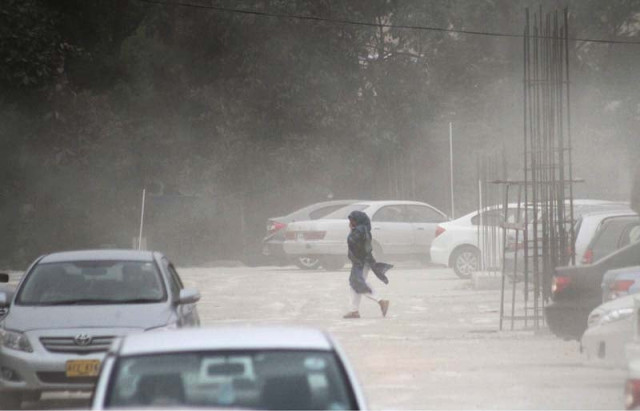Pakistan under strong influence of climate change
Heavy rains in April will help raise water level in depleting reservoirs

Heavy rains in April will help raise water level in depleting reservoirs. PHOTO: INP
“It is very rare that Pakistan has received heavy rainfall which continues for more than three days in the month of April,” said Pakistan Meteorological Department Director General Dr Ghulam Rasul.
While talking to The Express Tribune, he said the recent rain spell along with gusty winds continued for more than three to four days with high intensity over upper parts of Khyber-Pakhtunkhwa, Gilgit-Baltistan, AJK and adjoining northern parts of Punjab.
“In April, rain spell of low to moderate intensity continues for hardly two days,” he said.
Light rain brings temperature down
During last three days RawalaKot has received 150 millimeters of rainfall which is somewhat unusual in this month, he said.
Having heavy downpours this month is good for the country because it will help raise water level in depleting reservoirs, he added.
“It is expected that Pakistan will not face water shortage at least in April and May and farmers will get the required amount of water for wheat crops,” he said.
However after the rain spell in April, the coming week will remain hot and dry, he said.
“Though one or two more good rain spells are expected in April, meanwhile glaciers will also start melting by the end of this month which will also help fill the two major reservoirs of the country,” said Dr Rasul.
Talking about snowfall in Murree and upper parts of Pakistan, he said, “It is a normal thing. Sometimes these areas do receive rainfall in April.”
Need for building water resilient communities as crisis looms over Pakistan
However because of the snowfall in Murree, the mercury level in Islamabad, Rawalpindi and in adjourning areas went down by 10 degrees Celsius, he said.
Moreover, Islamabad and Rawalpindi were hit by a strong windstorm Thursday night. The wind blew with speed of 100km per hour at various places of the twin cities.
“PMD had already issued alerts for the strong windstorm,” he said.
According to Pakistan Meteorological Department, Global Climate Indicators such as North Atlantic Oscillations (NAO), Indian Ocean Dipole (IOD) are expected to remain neutral in April 2017, however, El Nino and Southern Oscillations (ENSO) are in developing phase.


1724319076-0/Untitled-design-(5)1724319076-0-208x130.webp)
















COMMENTS
Comments are moderated and generally will be posted if they are on-topic and not abusive.
For more information, please see our Comments FAQ